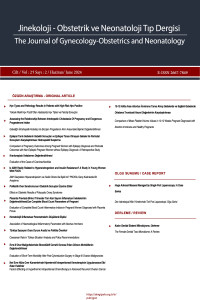Abstract
İnsan mikrobiyomu, mikroorganizmalar ve genetik materyalleri içeren karmaşık bir ekosistem olup insan sağlığı için hayati önem taşıyan fizyolojik süreçleri derinden etkiler. İnsan vücudundaki çeşitli bölgeler arasında, kadın genital sistemi çeşitli mikrobiyal toplulukları barındırır ve bu da vajinal mikrobiyata olarak bilinir. Bu mikrobiyata, vajinal sağlığı korumak ve enfeksiyonları önlemek için hayati bir rol oynar. Bu incelemede, jinekolojik hadiseler ile vajinal mikrobiyatanın karmaşık ilişkisini ele aldık; bunlar arasında bakteriyel vajinoz, insan papillomavirüsü (HPV) enfeksiyonu, servikal neoplazi, endometrial kanser, over kanseri, erken doğum ve kısırlık bulunmaktadır. Vajinal mikrobiyatadaki değişiklikler, özellikle koruyucu Lactobacillus türlerinin azalması ve anaerobik organizmaların artması şeklindeki mikrobiyal dengesizlik, bu durumlar için daha yüksek riskle ilişkilendirilmiştir. Özellikle bakteriyel vajinoz, HPV enfeksiyonunun kalıcılığı ve neoplastik gelişim ile ilişkilendirilen bir dengesizlik dikkat çekmektedir. Ayrıca, gebelik sırasında vajinal mikrobiyotun değişimleri, doğum sonuçları üzerinde etkilidir ve floradaki lactobacillis azlığı, kadınları erken doğuma yatkın hale getirir. Dahası, anormal vajinal flora, kadın kısırlığıyla ilişkilendirilmiş olup embriyo yerleşimi, tüplerdeki faktörler ve gebelik sonuçlarını etkiler. Vajinal mikrobiyatanın jinekolojik durumları üzerindeki rolünün anlaşılmasında ilerleme olmasına rağmen, özellikle randomize kontrollü çalışmalar olmak üzere daha fazla araştırma yapılması, temel mekanizmaları netleştirmek ve hedefe yönelik tedaviler geliştirmek için gereklidir.
References
- 1. Ursell LK, Metcalf JL, Parfrey LW, Knight R. Defining the human microbiome. Nutr Rev. 2012;70 Suppl 1(Suppl 1):S38-44. doi: 10.1111/j.1753-4887.2012.00493.x. PubMed PMID: 22861806; PubMed Central PMCID: PMCPMC3426293. 2. Eckburg PB, Bik EM, Bernstein CN, Purdom E, Deth- lefsen L, Sargent M, et al. Diversity of the human intestinal mic- robial flora. Science. 2005;308(5728):1635-8. Epub 20050414. doi: 10.1126/science.1110591. PubMed PMID: 15831718; Pub- Med Central PMCID: PMCPMC1395357. 3. Ravel J, Gajer P, Abdo Z, Schneider GM, Koenig SS, McCulle SL, et al. Vaginal microbiome of reproductive-age women. Proc Natl Acad Sci U S A. 2011;108 Suppl 1(Suppl 1):4680-7. Epub 20100603. doi: 10.1073/pnas.1002611107. PubMed PMID: 20534435; PubMed Central PMCID: PMCP- MC3063603.
Abstract
The human microbiome, a complex ecosystem consisting of microorganisms and their genetic material, profoundly impacts physiological processes crucial for human health. Among various niches within the human body, the female genital tract harbours a diverse microbial community, known as the vaginal microbiota, which plays a pivotal role in maintaining vaginal health and preventing infections. This review explores the intricate relationship between the vaginal microbiota and gynaecological conditions, including bacterial vaginosis, human papillomavirus (HPV) infection, cervical neoplasia, endometrial cancer, ovarian cancer, preterm birth, and infertility. Changes in the composition of the vaginal microbiota, known as dysbiosis, have been associated with a higher risk of these conditions. Notably, dysbiosis characterized by a reduction in protective Lactobacillus species and an increase in anaerobic organisms is associated with bacterial vaginosis, HPV infection persistence, and neoplastic development. Furthermore, alterations in the vaginal microbiota during pregnancy have implications for gestational outcomes, with a low frequency of lactobacilli predisposing women to preterm birth. Moreover, abnormal vaginal flora has been implicated in female infertility, affecting embryo implantation, tubal factors and pregnancy outcomes. Although there has been progressing in understanding the role of the vaginal microbiome in gynaecological health, additional research, particularly randomized controlled trials, is necessary to clarify the underlying mechanisms and devise targeted therapies.
References
- 1. Ursell LK, Metcalf JL, Parfrey LW, Knight R. Defining the human microbiome. Nutr Rev. 2012;70 Suppl 1(Suppl 1):S38-44. doi: 10.1111/j.1753-4887.2012.00493.x. PubMed PMID: 22861806; PubMed Central PMCID: PMCPMC3426293. 2. Eckburg PB, Bik EM, Bernstein CN, Purdom E, Deth- lefsen L, Sargent M, et al. Diversity of the human intestinal mic- robial flora. Science. 2005;308(5728):1635-8. Epub 20050414. doi: 10.1126/science.1110591. PubMed PMID: 15831718; Pub- Med Central PMCID: PMCPMC1395357. 3. Ravel J, Gajer P, Abdo Z, Schneider GM, Koenig SS, McCulle SL, et al. Vaginal microbiome of reproductive-age women. Proc Natl Acad Sci U S A. 2011;108 Suppl 1(Suppl 1):4680-7. Epub 20100603. doi: 10.1073/pnas.1002611107. PubMed PMID: 20534435; PubMed Central PMCID: PMCP- MC3063603.
Details
| Primary Language | English |
|---|---|
| Subjects | Obstetrics and Gynaecology |
| Journal Section | Review |
| Authors | |
| Publication Date | June 30, 2024 |
| Submission Date | March 17, 2024 |
| Acceptance Date | May 1, 2024 |
| Published in Issue | Year 2024 Volume: 21 Issue: 2 |

